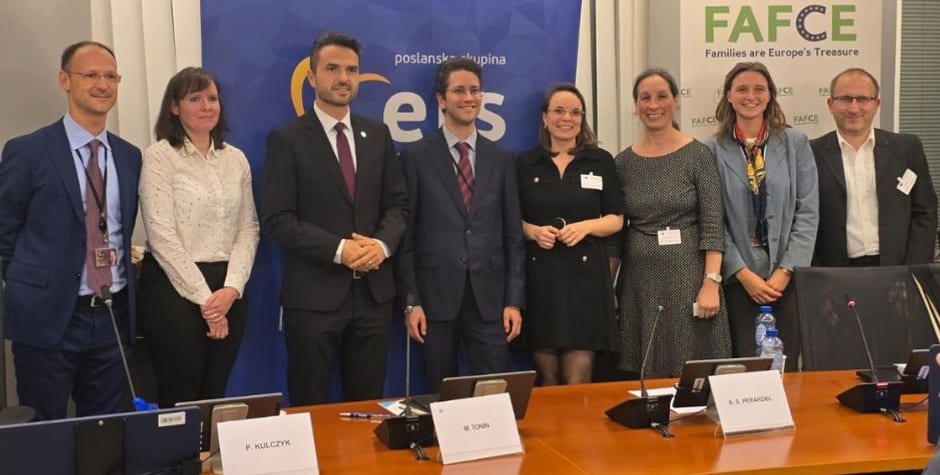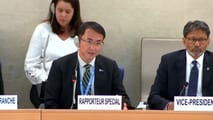

Protecting Children from Online Threats: ECLJ Speaks at the European Parliament
Protecting Children from Online Threats: ECLJ at the European Parliament
On September 23, 2025, a conference entitled “Protecting Children from Online Threats” was held at the European Parliament in Brussels, to which the European Centre for Law and Justice (ECLJ) was invited to speak. Focusing on the challenges posed by children's access to online pornography, it was organized by Slovenian MEP Matej Tonin (EPP), in collaboration with the Inštitut Integrum (Slovenia) and the Federation of Catholic Family Associations in Europe (FAFCE).
The conference also received support from the European Child Shield Platform, of which the ECLJ is a member. This network brings together legal and medical experts on pornography and more than 30 NGOs from 19 EU Member States. Its aim is to protect children by recognizing online pornography as a public health issue and promoting the sharing of best practices, resources, and knowledge across Europe.
Spanish psychologist Mar Álvarez Segura began by explaining the effects of pornography consumption on the adolescent brain and its consequences, particularly in terms of damage to the reward system and mental health.
Táňa Reháková, representing the Czech organization NePornu, then presented the disturbing results of a survey conducted in collaboration with the Slovak organization Tlakový hrniec. Conducted in 2023 among 1,684 young people aged 13 to 17, it reveals that while the first exposure to pornography occurs on average at the age of 11, for 20% of children it occurs before the age of 10. In more than 40% of cases, the first contact is accidental. It is also alarming to note that more than 52% of the boys surveyed say they watch pornography once a week or more. The negative effects have also been highlighted: an increase in psychological and relationship problems (loneliness), a decrease in satisfaction in intimate relationships, and the risk of compulsive consumption. With 85% of young people surveyed having unlimited access to pornographic content on mobile devices, Táňa Reháková states: “It is no longer a question of IF a child will see pornography, but WHEN. And therefore HOW they will be prepared for it.”
Based on the observation that 2.3 million children in France watch pornography every month, Anne-Sixtine Pérardel, an emotional and sexual life counselor, confirmed the importance of prevention, age verification on websites, and the implementation of filters by parents. She advocates for strong family policies that strengthen the parent-child relationship. It is important for parents to address the subject, but after talking about the beauty of sexuality.
Priscille Kulczyk, associate fellow at the ECLJ, presented some recent positive developments in the protection of children online, particularly with regard to age verification for access to pornographic websites. Firstly, there was the decision handed down on June 27, 2025, by the US Supreme Court in the case of Free Speech Coalition v. Paxton, which recognized that the obligation for pornographic websites to verify the age of their users was constitutional, particularly with regard to the First Amendment protecting freedom of expression. In France, legislative and jurisprudential advances have prompted some major pornographic websites to suspend their broadcasting since the summer of 2025, while others have implemented age verification. Finally, Priscille Kulczyk welcomed the adoption by the European Parliament on June 17, 2025, as part of the recast of the 2011 European Directive on combating sexual abuse and sexual exploitation of children, of an amendment requiring Member States to criminalize the distribution of pornography online without a robust age verification tool in place. She called on MEPs to remain vigilant to ensure that this provision is maintained during the upcoming interinstitutional negotiations and can be definitively adopted.
Finally, Matthieu Bruynseels (Federation of Catholic Family Associations in Europe – FAFCE) demonstrated the European Union's competence in protecting children online and presented one of its applications, the European Digital Services Act (DSA). He recalled the European Commission's action in this area: in July 2025, it published guidelines clarifying the requirements of Article 28 of the DSA relating to the protection of minors online. Finally, he affirmed the need for legislation to enforce strict age verification measures for access to pornographic websites, a ban on profiling and advertising to underage users, and penalties for non-compliance.
The conference ended with a question-and-answer session that allowed for dialogue with the audience. Various issues emerged, including the idea of a resolution on the use of connected devices in schools and the question of so-called “ethical pornography,” which, for Táňa Reháková, is tantamount to giving a child beer instead of hard liquor. It was repeatedly stated that legislation alone is insufficient and that the role of parents, as their children's primary educators, is irreplaceable when it comes to protecting minors online, and that they must therefore be effectively supported in their task.













